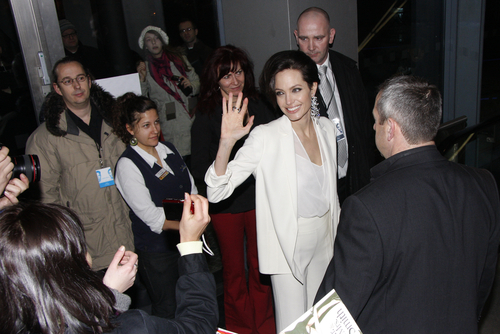Following the actor Angelina Jolie’s high-profile visit to a Syrian refugee camp last week, the CEO of Save the Children, Justin Forsyth defends the power of celebrity endorsement in the third sector.
Writing in the Observer yesterday, he argued that “the benefits of celebrity are not fabled but real – and can produce very concrete results.” His adversary, the journalist Peter Stanford counters: “We may live in the celebrity age but to imagine that a big name will automatically open wallets and hearts is to underestimate our potential supporters.”

The question of whether celebrities are a Midas-like influence on charities, helping to raise awareness and cash for good causes, or are in fact trivialising the very issues they claim to support is one that many charities have had cause to ask themselves.
Save the Children has called on an impressive roster of famous supporters to back its campaigns, including George Clooney, Brad Pitt, David Beckham, Mariella Frostrup and Simon Cowell.
“Of course the celebrity touch isn’t everything. Every charity – however big or small – needs to have a clear and convincing message about what it’s trying to achieve,” says Forsyth.
Spreading the word
But, he claims, the involvement of a celebrity can help charities to spread the word among a broader range of people. “Stacey Soloman, a great mum, travelled to Malawi with us as part of our No Child Born to Die campaign, to highlight the plight of mums dying in childbirth. Her reach [as an X-Factor star], through the popular media is amazing. Through her experiences, the words of the mothers she met in Malawi were heard in the living rooms of millions of families across the UK.”
However, this raises the issue, says Stanford, of why people should support the work of charities in the first place; “because Bono and Stacey Soloman give it their imprimatur, or because these are crying injustices that scar our world and degrade our own humanity?”
The issue for Forsyth is one of reach; in culture fascinated with the cult of celebrity, words issued by a X-Factor singer or film star reach far more people than those articulated by charity executives, however, loudly they shout.
The power of famous voices
“I just don’t believe we’ll achieve the enormous change we need in the world – from saving children’s lives to fighting for human rights – without the power of famous voices,” says Forsyth. “We cant afford to be too cautious or too purist; the task is too urgent and too important.”
What do you think? We’ve talked about the potential benefits celebrity favour can bring before (here), but what are your thoughts? Are celebrities themselves the hangers-on when it comes to charity, or do they make a valuable contribution to the causes they lend their name to? Get in touch via our Twitter feed or Facebook page.




No comments! Be the first commenter?